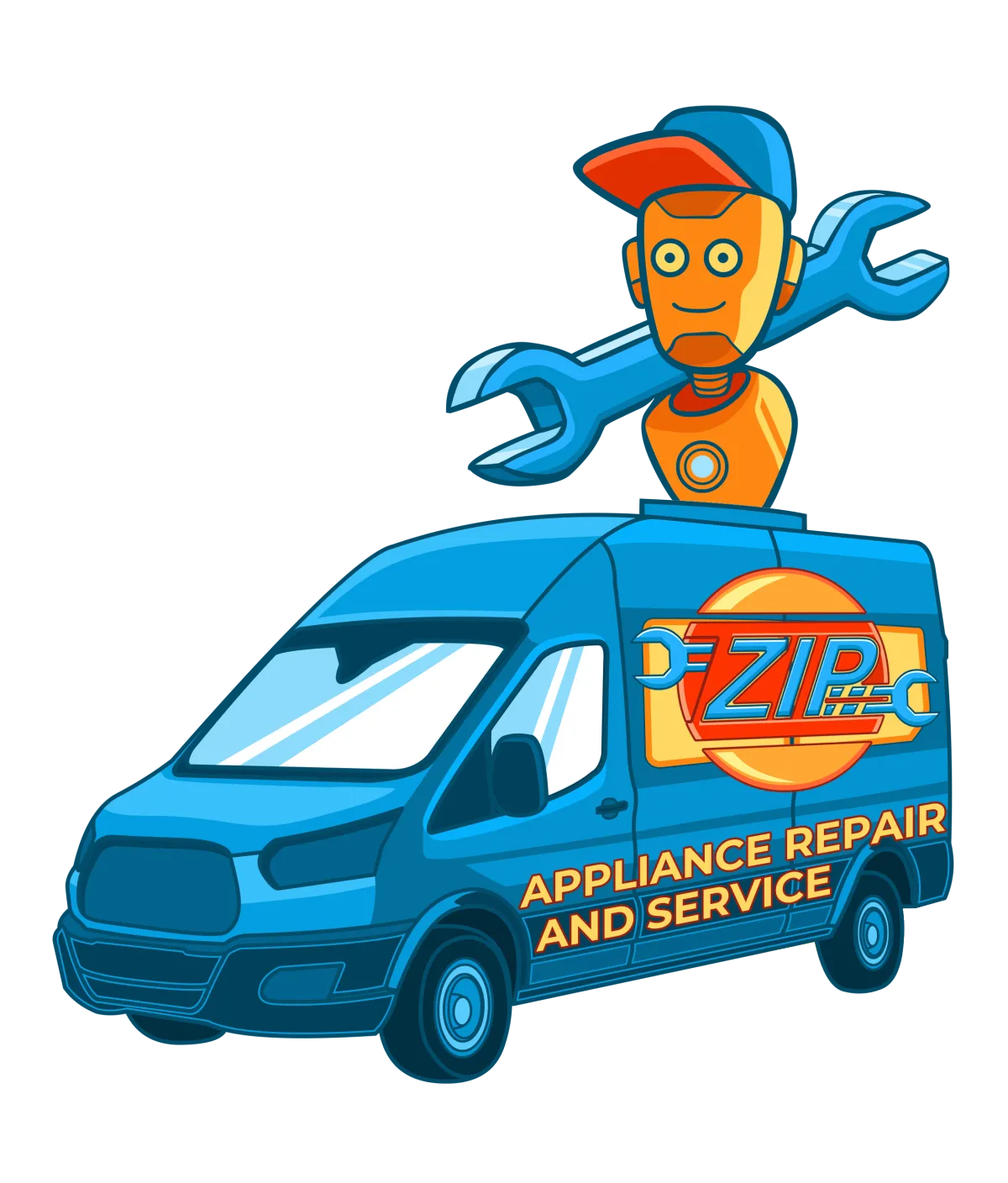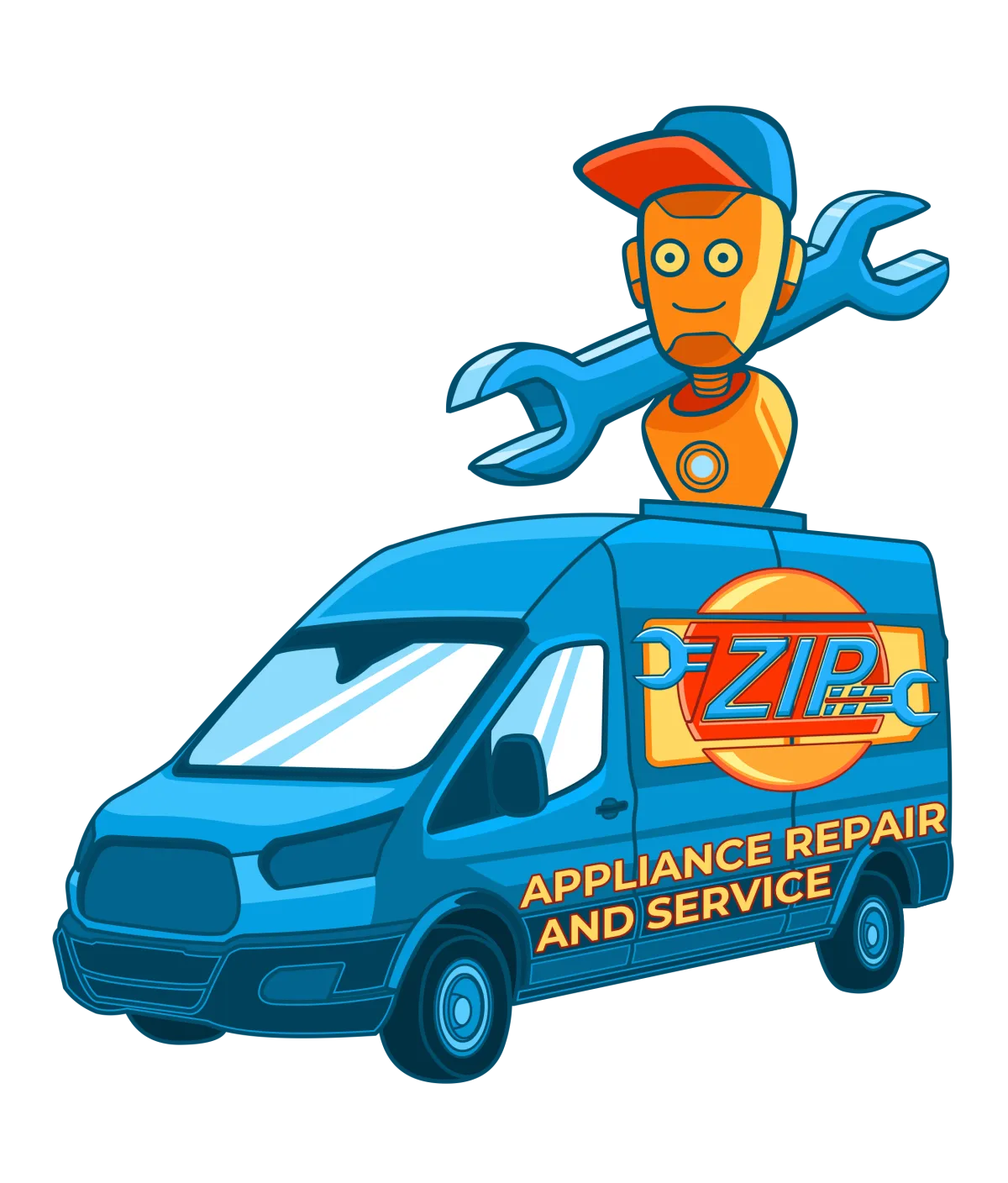THE FASTEST TOOLS IN TOWN
ZIP APPLIANCE REPAIR & SERVICE
Phone: (559) 272-4265
Phone: (559) 272-4265
Appliance Repair Tips For Fresno, CA Residents

Microwave Repairs: Fixing What Matters and Letting Go of the Rest
"Knowing when to fix your microwave and when to let go can save you time, money, and stress—Microwave Repairs: Fixing What Matters and Letting Go of the Rest has the answers." - Appliance Boss
Introduction
A microwave is one of the most convenient kitchen appliances, and when it starts malfunctioning, it can throw off your whole day. Microwave repairs can often be tricky, but knowing when it's worth fixing and when it's time to let go can save you money, time, and frustration. Understanding the balance between repair costs and the price of a new microwave is key to making an informed decision. In this article, we will explore common microwave issues, what’s worth fixing, and when to replace your microwave altogether. Let’s dive in!
Why Microwave Repairs Matter: Understanding When to Fix or Replace
Microwaves are incredibly convenient, helping you prepare meals in a fraction of the time it takes with a traditional stove or oven. But when they stop working, it can disrupt your entire kitchen routine. Before you toss your malfunctioning microwave in favor of a new one, it’s important to assess whether the repair is worth it. Repairing a microwave can be a more cost-effective option than buying a new one, especially if the problem is something minor. However, if the issue is serious or the microwave is older, it may be more practical to invest in a new appliance.
The Cost of Repairs vs. Buying a New Microwave
Repairs can range from a few dollars to over a hundred, depending on the complexity of the issue. Replacing a microwave, on the other hand, can cost anywhere from $50 to $500 or more. In some cases, if a microwave is under warranty, repairs can be free or low-cost. However, if the microwave is older, parts may no longer be available, and you may spend more on repairs than a new microwave would cost. Ultimately, the decision depends on the age of the appliance, the cost of repairs, and how often the microwave is used.

How Microwaves Work: A Quick Overview
To make an informed decision on repairs, it helps to understand how a microwave operates. A microwave uses electromagnetic waves, also known as microwaves, to heat food. These waves penetrate the food and cause water molecules within it to vibrate, generating heat. The heat then cooks the food. The microwave oven is composed of several key components that work together to ensure the appliance functions properly. Let’s take a closer look.
The Basic Components of a Microwave
A microwave consists of a few essential components:
Magnetron: The device that generates microwaves.
High-voltage capacitor: Stores energy to power the magnetron.
Microwave cavity: The space where food is placed, and microwaves are generated.
Turntable: Rotates the food for even cooking.
Control panel: Allows you to set the time and power level.
Understanding these components will help you diagnose problems and determine what’s worth fixing.
How a Microwave Heats Food: The Science Behind It
Microwaves work by emitting electromagnetic waves that agitate water molecules in food, causing them to vibrate and create friction, which produces heat. This is why food cooks faster in a microwave than in conventional ovens. The heat is distributed through the food’s water molecules, which leads to faster cooking and even heating. When these systems break down, you may notice uneven heating or longer cooking times.
Common Microwave Issues and What They Mean
Microwaves can experience a range of issues, from simple fixes to complex failures. Let’s break down some of the most common problems and what they typically indicate.
Microwave Not Turning On: Possible Causes
If your microwave doesn’t turn on at all, it could be due to a tripped circuit breaker, a faulty door switch, or a defective fuse. This can often be a quick fix, especially if the fuse is the issue.
Food Not Heating Evenly: Why It Happens
If your microwave isn’t heating food evenly, the turntable may not be working, or there could be an issue with the magnetron. Uneven heating can also be caused by a malfunction in the microwave’s settings or controls.
Microwave Turns Off Randomly: What’s Behind It?
Random shutdowns could be due to an overheating issue, a malfunctioning door switch, or internal wiring problems. If the microwave is old, it may be due to wear and tear on the internal components.
Sparks or Arcing: The Danger Signs
Sparks or arcing inside the microwave are serious issues. They could indicate a problem with the magnetron, high-voltage capacitor, or even food particles inside the appliance causing the issue. Sparks should never be ignored, as they pose a potential fire hazard.
Unusual Sounds: When Your Microwave is Trying to Tell You Something
If your microwave starts making unusual noises like grinding or buzzing sounds, it could be a sign that the turntable motor, cooling fan, or magnetron is failing. These sounds should be checked out before they lead to bigger problems.
Burnt Smell or Smoke: A Red Flag for Serious Damage
A burnt smell or smoke coming from the microwave indicates a serious problem, usually related to the magnetron or the electrical system. This is not a fix-it-yourself situation and requires immediate attention from a professional.
When to Fix and When to Let Go
At some point, it’s important to evaluate whether it’s worth investing in repairs or simply replacing the microwave. Here are some key factors to consider.
Determining Repair Costs vs. Replacement
If the cost of repairs exceeds half the price of a new microwave, it may be better to replace the appliance. Keep in mind that repair costs vary depending on the issue and whether you choose to hire a professional.
How Old is Your Microwave? When Age Matters
If your microwave is over 10 years old, repairs may not be worth the investment, as newer models are more energy-efficient and have advanced features. Microwaves typically last about 9-10 years.
The Frequency of Issues: Are You Dealing with a Pattern?
If your microwave has had multiple issues over the years, it may be more cost-effective to replace it rather than continue dealing with recurring problems.
Warranty Considerations: Should You Still Repair?
If your microwave is under warranty, repairs are often free or at a minimal cost. However, if the warranty has expired, repairs can become expensive, and replacement may be a better option.
Energy Efficiency: Is Repairing the Best Option?
Older microwaves may not be as energy-efficient as newer models. If you’re facing frequent breakdowns, it might be a sign to replace the microwave with an energy-efficient model.
Microwave Repairs: What’s Worth Fixing
Some microwave issues are relatively simple to fix and can significantly extend the appliance's lifespan.
Replacing the Door Seal: A Simple Fix for Effective Results
A worn-out door seal is one of the most common issues that can be easily fixed, improving the microwave’s efficiency and preventing leaks.
Fixing a Malfunctioning Turntable Motor
A malfunctioning turntable motor can prevent food from heating evenly. Replacing this motor is usually affordable and can restore your microwave’s function.
Microwave Light Bulb Replacement
A burned-out light bulb is a simple fix that doesn’t require replacing the entire microwave. It’s a cheap and easy repair that can improve visibility while cooking.
Dealing with Blown Fuses
Blown fuses are a relatively inexpensive fix. If your microwave doesn’t turn on, replacing the fuse may restore its function.
Addressing the Control Panel and Buttons
Faulty control panels or buttons can sometimes be repaired without replacing the entire system. Depending on the issue, a technician may be able to replace specific components.
Unclogging the Microwave Vent
Over time, vents can become clogged with grease and food debris. Regular cleaning can prevent blockages and improve microwave performance.
Microwave Repairs: What’s Not Worth Fixing
Some microwave issues are so severe or expensive to fix that they’re not worth repairing.
Microwave Magnetron Failure: Why It’s a Dealbreaker
The magnetron is the heart of the microwave. If it fails, the cost of replacement often exceeds the cost of a new microwave, making repairs impractical.
Expensive Control Board Issues
Control board issues can be costly to repair. If the control board is malfunctioning, it may be cheaper to replace the entire microwave.
Major Mechanical Failures: When It’s Just Not Worth It
Severe mechanical failures, like a broken fan motor or malfunctioning magnetron, often signal the end of your microwave’s lifespan.
Outdated Models: Why Repairing May Not Be Feasible
If your microwave is outdated, it may be difficult to find replacement parts. In this case, replacement is often the best choice.
DIY Repairs: What You Can Safely Handle
Many minor issues with microwaves can be fixed at home, saving you time and money.
Simple Fixes for Common Microwave Issues
Replacing a light bulb or unclogging a vent can often be done on your own. Make sure to follow proper safety precautions before attempting DIY repairs.
When to Avoid DIY and Call a Professional
For more complex issues, such as magnetron failures or control board problems, it’s best to consult a professional.
Tools You’ll Need for Basic Repairs
For DIY repairs, you’ll need a basic tool kit, including screwdrivers, pliers, and a multimeter to test electrical components.
The Role of Professional Repair Services
For significant issues, professionals bring expertise to the table, ensuring that repairs are done safely and effectively.
Why You Should Consult a Professional for Complex Issues
A technician can diagnose the issue accurately and fix complex problems that may be beyond your DIY skills.
What to Expect from a Microwave Repair Technician
Technicians will assess the problem, provide an estimate, and repair the appliance safely. Make sure to ask about warranty coverage on repairs.
How to Choose a Reliable Repair Service
Look for licensed, insured professionals with good reviews. A reputable company will give you a clear estimate before proceeding with repairs.
How to Extend Your Microwave’s Lifespan
Regular maintenance and care can help your microwave last longer and perform better.
Regular Maintenance Tips to Keep Your Microwave in Top Shape
Keep the interior clean, replace worn-out parts, and ensure the microwave’s vents are unclogged. Regular use can also help the microwave last longer.
Cleaning Your Microwave for Better Performance
A clean microwave not only works more efficiently but also lasts longer. Wipe down the interior after each use to remove food splatters.
Proper Usage Habits: Avoiding Overuse and Wear
Avoid overloading the microwave or using it for non-food purposes. This can strain the motor and other components, leading to premature breakdowns.
Is It Time to Replace Your Microwave?
If your microwave is beyond repair or not working efficiently, it may be time to replace it. Look for a model that suits your needs and budget.
Signs You’re Better Off Upgrading
If repairs are costly and the microwave is over 10 years old, upgrading may be the best option.
Choosing the Right Microwave for Your Needs
Consider size, features, and energy efficiency when choosing a new microwave. It’s important to pick a model that meets your specific cooking needs.
How to Dispose of Your Old Microwave Responsibly
Recycling is the best option for disposing of your old microwave. Many electronics stores offer recycling services, ensuring that your appliance is disposed of responsibly.
Conclusion
Weighing the pros and cons of microwave repairs versus replacement is essential for making an informed decision. If your microwave is beyond repair, investing in a new one might be the best choice. If it’s a minor issue, fixing what matters can keep your appliance running smoothly for years to come. Always assess the cost, the age of the appliance, and the severity of the problem to make the best choice. If you need help diagnosing the issue or choosing the right solution for your microwave, Zip Appliance Repair and Service is here to assist. Visit our website at fresno.ziprepairservice.com or call us at (559) 272-4265 for expert repair services and advice.

Microwave Repairs: Fixing What Matters and Letting Go of the Rest
"Knowing when to fix your microwave and when to let go can save you time, money, and stress—Microwave Repairs: Fixing What Matters and Letting Go of the Rest has the answers." - Appliance Boss
Introduction
A microwave is one of the most convenient kitchen appliances, and when it starts malfunctioning, it can throw off your whole day. Microwave repairs can often be tricky, but knowing when it's worth fixing and when it's time to let go can save you money, time, and frustration. Understanding the balance between repair costs and the price of a new microwave is key to making an informed decision. In this article, we will explore common microwave issues, what’s worth fixing, and when to replace your microwave altogether. Let’s dive in!
Why Microwave Repairs Matter: Understanding When to Fix or Replace
Microwaves are incredibly convenient, helping you prepare meals in a fraction of the time it takes with a traditional stove or oven. But when they stop working, it can disrupt your entire kitchen routine. Before you toss your malfunctioning microwave in favor of a new one, it’s important to assess whether the repair is worth it. Repairing a microwave can be a more cost-effective option than buying a new one, especially if the problem is something minor. However, if the issue is serious or the microwave is older, it may be more practical to invest in a new appliance.
The Cost of Repairs vs. Buying a New Microwave
Repairs can range from a few dollars to over a hundred, depending on the complexity of the issue. Replacing a microwave, on the other hand, can cost anywhere from $50 to $500 or more. In some cases, if a microwave is under warranty, repairs can be free or low-cost. However, if the microwave is older, parts may no longer be available, and you may spend more on repairs than a new microwave would cost. Ultimately, the decision depends on the age of the appliance, the cost of repairs, and how often the microwave is used.

How Microwaves Work: A Quick Overview
To make an informed decision on repairs, it helps to understand how a microwave operates. A microwave uses electromagnetic waves, also known as microwaves, to heat food. These waves penetrate the food and cause water molecules within it to vibrate, generating heat. The heat then cooks the food. The microwave oven is composed of several key components that work together to ensure the appliance functions properly. Let’s take a closer look.
The Basic Components of a Microwave
A microwave consists of a few essential components:
Magnetron: The device that generates microwaves.
High-voltage capacitor: Stores energy to power the magnetron.
Microwave cavity: The space where food is placed, and microwaves are generated.
Turntable: Rotates the food for even cooking.
Control panel: Allows you to set the time and power level.
Understanding these components will help you diagnose problems and determine what’s worth fixing.
How a Microwave Heats Food: The Science Behind It
Microwaves work by emitting electromagnetic waves that agitate water molecules in food, causing them to vibrate and create friction, which produces heat. This is why food cooks faster in a microwave than in conventional ovens. The heat is distributed through the food’s water molecules, which leads to faster cooking and even heating. When these systems break down, you may notice uneven heating or longer cooking times.
Common Microwave Issues and What They Mean
Microwaves can experience a range of issues, from simple fixes to complex failures. Let’s break down some of the most common problems and what they typically indicate.
Microwave Not Turning On: Possible Causes
If your microwave doesn’t turn on at all, it could be due to a tripped circuit breaker, a faulty door switch, or a defective fuse. This can often be a quick fix, especially if the fuse is the issue.
Food Not Heating Evenly: Why It Happens
If your microwave isn’t heating food evenly, the turntable may not be working, or there could be an issue with the magnetron. Uneven heating can also be caused by a malfunction in the microwave’s settings or controls.
Microwave Turns Off Randomly: What’s Behind It?
Random shutdowns could be due to an overheating issue, a malfunctioning door switch, or internal wiring problems. If the microwave is old, it may be due to wear and tear on the internal components.
Sparks or Arcing: The Danger Signs
Sparks or arcing inside the microwave are serious issues. They could indicate a problem with the magnetron, high-voltage capacitor, or even food particles inside the appliance causing the issue. Sparks should never be ignored, as they pose a potential fire hazard.
Unusual Sounds: When Your Microwave is Trying to Tell You Something
If your microwave starts making unusual noises like grinding or buzzing sounds, it could be a sign that the turntable motor, cooling fan, or magnetron is failing. These sounds should be checked out before they lead to bigger problems.
Burnt Smell or Smoke: A Red Flag for Serious Damage
A burnt smell or smoke coming from the microwave indicates a serious problem, usually related to the magnetron or the electrical system. This is not a fix-it-yourself situation and requires immediate attention from a professional.
When to Fix and When to Let Go
At some point, it’s important to evaluate whether it’s worth investing in repairs or simply replacing the microwave. Here are some key factors to consider.
Determining Repair Costs vs. Replacement
If the cost of repairs exceeds half the price of a new microwave, it may be better to replace the appliance. Keep in mind that repair costs vary depending on the issue and whether you choose to hire a professional.
How Old is Your Microwave? When Age Matters
If your microwave is over 10 years old, repairs may not be worth the investment, as newer models are more energy-efficient and have advanced features. Microwaves typically last about 9-10 years.
The Frequency of Issues: Are You Dealing with a Pattern?
If your microwave has had multiple issues over the years, it may be more cost-effective to replace it rather than continue dealing with recurring problems.
Warranty Considerations: Should You Still Repair?
If your microwave is under warranty, repairs are often free or at a minimal cost. However, if the warranty has expired, repairs can become expensive, and replacement may be a better option.
Energy Efficiency: Is Repairing the Best Option?
Older microwaves may not be as energy-efficient as newer models. If you’re facing frequent breakdowns, it might be a sign to replace the microwave with an energy-efficient model.
Microwave Repairs: What’s Worth Fixing
Some microwave issues are relatively simple to fix and can significantly extend the appliance's lifespan.
Replacing the Door Seal: A Simple Fix for Effective Results
A worn-out door seal is one of the most common issues that can be easily fixed, improving the microwave’s efficiency and preventing leaks.
Fixing a Malfunctioning Turntable Motor
A malfunctioning turntable motor can prevent food from heating evenly. Replacing this motor is usually affordable and can restore your microwave’s function.
Microwave Light Bulb Replacement
A burned-out light bulb is a simple fix that doesn’t require replacing the entire microwave. It’s a cheap and easy repair that can improve visibility while cooking.
Dealing with Blown Fuses
Blown fuses are a relatively inexpensive fix. If your microwave doesn’t turn on, replacing the fuse may restore its function.
Addressing the Control Panel and Buttons
Faulty control panels or buttons can sometimes be repaired without replacing the entire system. Depending on the issue, a technician may be able to replace specific components.
Unclogging the Microwave Vent
Over time, vents can become clogged with grease and food debris. Regular cleaning can prevent blockages and improve microwave performance.
Microwave Repairs: What’s Not Worth Fixing
Some microwave issues are so severe or expensive to fix that they’re not worth repairing.
Microwave Magnetron Failure: Why It’s a Dealbreaker
The magnetron is the heart of the microwave. If it fails, the cost of replacement often exceeds the cost of a new microwave, making repairs impractical.
Expensive Control Board Issues
Control board issues can be costly to repair. If the control board is malfunctioning, it may be cheaper to replace the entire microwave.
Major Mechanical Failures: When It’s Just Not Worth It
Severe mechanical failures, like a broken fan motor or malfunctioning magnetron, often signal the end of your microwave’s lifespan.
Outdated Models: Why Repairing May Not Be Feasible
If your microwave is outdated, it may be difficult to find replacement parts. In this case, replacement is often the best choice.
DIY Repairs: What You Can Safely Handle
Many minor issues with microwaves can be fixed at home, saving you time and money.
Simple Fixes for Common Microwave Issues
Replacing a light bulb or unclogging a vent can often be done on your own. Make sure to follow proper safety precautions before attempting DIY repairs.
When to Avoid DIY and Call a Professional
For more complex issues, such as magnetron failures or control board problems, it’s best to consult a professional.
Tools You’ll Need for Basic Repairs
For DIY repairs, you’ll need a basic tool kit, including screwdrivers, pliers, and a multimeter to test electrical components.
The Role of Professional Repair Services
For significant issues, professionals bring expertise to the table, ensuring that repairs are done safely and effectively.
Why You Should Consult a Professional for Complex Issues
A technician can diagnose the issue accurately and fix complex problems that may be beyond your DIY skills.
What to Expect from a Microwave Repair Technician
Technicians will assess the problem, provide an estimate, and repair the appliance safely. Make sure to ask about warranty coverage on repairs.
How to Choose a Reliable Repair Service
Look for licensed, insured professionals with good reviews. A reputable company will give you a clear estimate before proceeding with repairs.
How to Extend Your Microwave’s Lifespan
Regular maintenance and care can help your microwave last longer and perform better.
Regular Maintenance Tips to Keep Your Microwave in Top Shape
Keep the interior clean, replace worn-out parts, and ensure the microwave’s vents are unclogged. Regular use can also help the microwave last longer.
Cleaning Your Microwave for Better Performance
A clean microwave not only works more efficiently but also lasts longer. Wipe down the interior after each use to remove food splatters.
Proper Usage Habits: Avoiding Overuse and Wear
Avoid overloading the microwave or using it for non-food purposes. This can strain the motor and other components, leading to premature breakdowns.
Is It Time to Replace Your Microwave?
If your microwave is beyond repair or not working efficiently, it may be time to replace it. Look for a model that suits your needs and budget.
Signs You’re Better Off Upgrading
If repairs are costly and the microwave is over 10 years old, upgrading may be the best option.
Choosing the Right Microwave for Your Needs
Consider size, features, and energy efficiency when choosing a new microwave. It’s important to pick a model that meets your specific cooking needs.
How to Dispose of Your Old Microwave Responsibly
Recycling is the best option for disposing of your old microwave. Many electronics stores offer recycling services, ensuring that your appliance is disposed of responsibly.
Conclusion
Weighing the pros and cons of microwave repairs versus replacement is essential for making an informed decision. If your microwave is beyond repair, investing in a new one might be the best choice. If it’s a minor issue, fixing what matters can keep your appliance running smoothly for years to come. Always assess the cost, the age of the appliance, and the severity of the problem to make the best choice. If you need help diagnosing the issue or choosing the right solution for your microwave, Zip Appliance Repair and Service is here to assist. Visit our website at fresno.ziprepairservice.com or call us at (559) 272-4265 for expert repair services and advice.
If your dryer has been giving you problems, contact Zip Appliance Repair & Service at (559) 272-4265

Appliance Repair In A Zip
If you need a dryer repair call our Team at (559) 272-4265, or visit our online scheduling page to request service.
Appliance Repair
HAVE A QUESTION, CALL (559) 272-4265

Online Offers
Take advantage of our online discount offers - save time and money...

Residential & Commercial appliances
See what our company can do for you

Appliance Repair Tips
If your appliance is not working properly...

1405 Commercial Way ste 100
Bakersfield, CA 93309
Lic # 1116346
Equipment We Sevice
- A Call To Confirm Your Appointment Time
- A Email Detailing Your Assigned Technician
- Information Needed Before The Repair Can Be Started
- An Estimate Of Work To Be Done
© 2025 ZIP APPLIANCE REPAIR & SERVICE LLC







